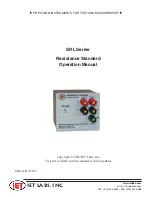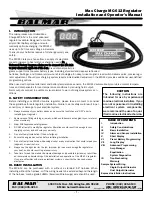
OM0239
Page 34 of 72
April 2021
7.1.1
Manual Decon
1. Disconnect power to the cabinet. Remove screws at each upper side of the control center and allow the
control center to rotate down, resting on the safety straps. Disconnect electrical connectors on left side.
Disconnect electrical from right side. (Be sure to note the location of the supply and exhaust sensor wires
before disconnecting them from the main board). Remove control center by disconnecting safety straps
lifting the control cable up and away from cabinet. Fold and pinch tubing to seal.
2. Remove the front decorative panel via top/front fasteners.
3. Remove window assembly (both frame and window, either being manual, sliding, or automatic) via the
upper and lower fasteners (Refer to BCD-16376). At this point, the sliding window assembly can be
removed.
4. Remove exhaust sensor shrouds.
5. Remove the diffuser screen and gasket around perimeter of workzone (if present).
6. Prepare decontamination equipment. Reference decontamination procedure and use the following chart
to calculate chemical requirements.
Note: The outlets in the work area are energized as long as the cabinet is plugged in and
switched on the front panel. Unplug the cabinet before decontamination equipment is
plugged into these outlets. The control centers electrical connectors may be re-attached
to utilize the cabinet's interior outlets and fan during the decontamination.
8. Set control center on its side resting on the left side of cabinet. Then plug in the 16-pin connector cable
from the cabinet to the control center. Reconnect power to the cabinet. The outlets and blower can then
be activated.
9. Seal front and top openings using plastic and tape.
BE SURE CABINET IS TOTALLY SEALED TO PREVENT ANY
LABORATORY EXPOSURE TO DECONTAMINATION GAS,
VAPOR OR MIST.
10. Perform decontamination procedure.
7.1.2
Auto Decon
The Auto Decon process is intended to be used with any automated cabinet decontamination process (i.e.
hydrogen peroxide, chlorine dioxide, etc.) The automated decon process parameters are typically set up
independently of the cabinet. Inlet and outlet ports from the automated decon machine are connected to the
cabinet. The cabinet control system may be set up to run simultaneously aiding the decontaminate circulation
throughout the cabinet during the entire decon cycle.
To validate two
decon processes and associated cabinet set up procedure; NuAire utilized a Bioquell Clarus II H₂O₂
and a Steris X10 the following process was performed by the Bioquell Clarus II.
1.
Remove armrest via fasteners.
2.
Remove exhaust shroud and sensor.
3.
Seal top and front openings using either heavy plastic and duct tape or seal plates.
Seal all joints with tape as indicated on drawing BCD-16509.
Note:
Top and front seal plates may be obtained by contacting NuAire representative or distributor.
4.
Attach inlet and outlet connections to decontamination system along with pressure and/or concentration
sensor if provided.
Cabinet Size
300S
400S
500S
600S
Cabinet
Dimensions
58-7/8 x 28 x 34-3/8 in.
(1.50 x .711 x .873 m)
58-7/8 x 28 x 46-3/8
(1.50 x .711 x 1.18 m)
58-7/8 x 28 x 58-3/8
(1.50 x .711 x 1.48m)
58-7/8 x 28 x 70-3/8
(1.50 x .739 x 1.88 m)
Cabinet
Volume
32.79 cu. ft.
(.929 cu. m)
44.24 cu. ft.
(1.25 cu. m)
55.69 cu. ft.
(1.58 cu. m)
67.14 cu. ft.
(1.90 cu. m)
CAUTION
!
Summary of Contents for LabGard ES NU-543-300S
Page 7: ...OM0239 Page 7 of 72 April 2021 ...
Page 9: ...OM0239 Page 9 of 72 April 2021 ...
Page 10: ...OM0239 Page 10 of 72 April 2021 ...
Page 11: ...OM0239 Page 11 of 72 April 2021 ...
Page 12: ...OM0239 Page 12 of 72 April 2021 ...
Page 16: ...OM0239 Page 16 of 72 April 2021 ...
Page 21: ...OM0239 Page 21 of 72 April 2021 ...
Page 35: ...OM0239 Page 35 of 72 April 2021 ...
Page 67: ...OM0239 Page 67 of 72 April 2021 ...
Page 68: ...OM0239 Page 68 of 72 April 2021 ...
Page 69: ...OM0239 Page 69 of 72 April 2021 ...
Page 70: ...OM0239 Page 70 of 72 April 2021 ...
















































